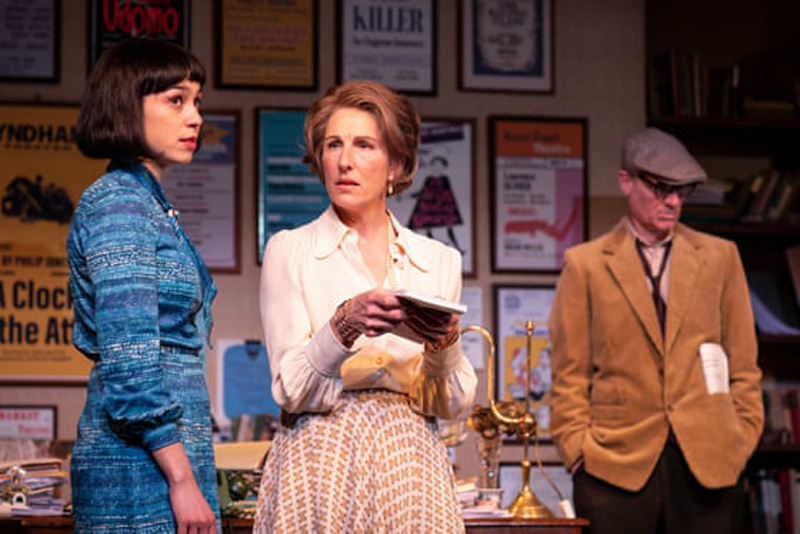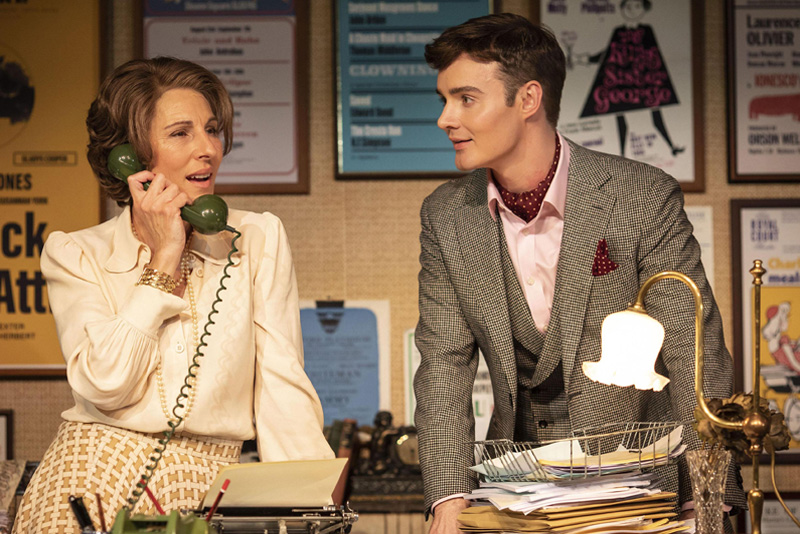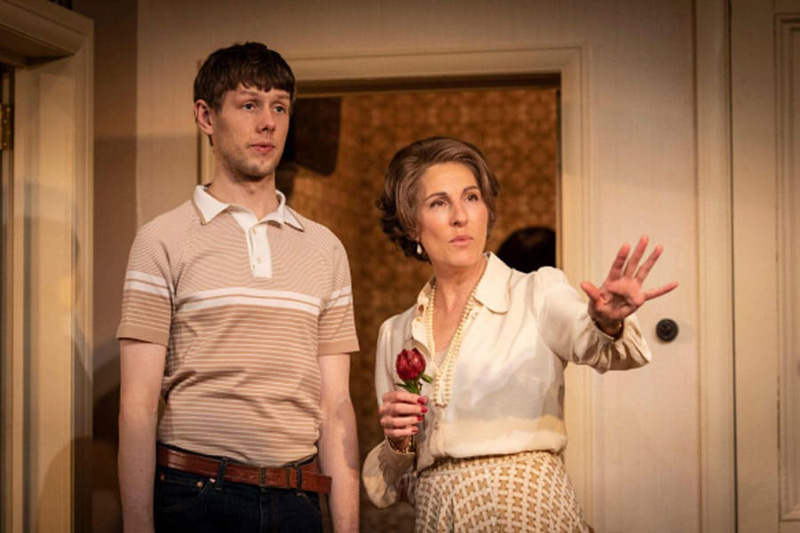“Peggy For You”, Hampstead Theatre
Jeremy Malies in north London
20 December 2021
Peggy for You, written by Alan Plater in 1999, is the last in a Covid-interrupted retrospective season in which Hampstead Theatre has revived plays that it has premiered over the last 60 years. The venue has built its considerable reputation on championing new drama.

Danusia Samal, Tamsin Greig and Trevor Fox. Photo credit: Helen Maybanks.
The piece is set in the late 1960s and follows the Aristotelian unities of time and place; we spend a single day in one location, the London office of Peggy Ramsay, a theatrical literary agent of such fame and force of character that there is no modern parallel nor will there be one soon. She dominated her field from the 1950s to the 1980s, representing such playwrights as Robert Bolt, Joe Orton, David Hare, and Caryl Churchill.
As for unity of action, apart from an off-stage death, nothing much happens which means that matters teeter on being no more than a series of aphorisms for Tamsin Greig in the title role. A writer as skilful as Plater (a real-life client of Ramsay who was much better known as a television writer than a playwright) must of course have been aware of this and perhaps his aim was to pay homage to Ramsay’s quick-wittedness, charisma, and vivacity in a form of shorthand at the expense of a full plotline.
The male characters represent playwrights at different stages – successful or otherwise – of a writing career. First to appear is the superficially callow but astute teenager Simon (Josh Finan, excellent) who repeatedly asks: “What is a play?” At no time is his question given a real answer but he is told to sit in a corner and read Ibsen which seems good advice.

Tamsin Greig and Jos Vantyler. Photo credit: Helen Maybanks.
Occasionally the torrent of bons mots misfires: “Drama,” Ramsay announces, “like sex, should never be rushed.” Yuk! Despite a few duff lines, Greig is always sensual; you feel she may yet seduce Simon after seeing his debut play above a pub in the north London suburb of Crouch End. She is powerful when pointing to a chaise longue and telling us that Ionesco fucked her spectacularly on it. A high point of the whole evening for me is a series of gags early on in which Ramsay excuses herself from the press night of yet another production of Uncle Vanya at the National Theatre in order to watch Simon’s play.
Greig excels in capturing the legendary indiscretions and excoriating candour of her character who can flit from an apposite Shakespearian quotation to four-letter expletives in an instant. Predictably, Greig’s timing has a lazer-like quality and I sense that she will emphasize or play down individual jokes on each night according to how she judges the audience.
But audience interaction for press night is muted. Either the younger theatre critics don’t pick it all up (and why should they; a play should not be a glorified bingo card in which you tick the allusions you have recognized) or matters are intelligible but no longer of any consequence. An ‘in-joke’ about Peggy mixing up two of her clients called Alan (Plater and Ayckbourn) is mildly amusing, but even for me and a supremely theatrically literate companion, the range of names referenced proves hard going.
The play should be a star vehicle in the conventional sense (Maureen Lipman was Ramsay in the world premiere), but if there is a true star turn in this production it’s the laterally divided set by James Cotterill. Stage right is Peggy’s office-cum-lounge with manuscripts tumbling out of folders, a wine-stained carpet, a convincing bookshelf – Alan Bennett once wrote an essay on how difficult it is to make books look appropriate on stage – and side tables with yet more play scripts submitted by hopeful writers.

Josh Finan and Tamsin Greig. Photo credit: Helen Maybanks.
Stage left is reception where a secretary fields the constant telephone calls. Johanna Town’s lighting here has a colder quality suggesting fluorescent units, all of which shows much technical proficiency that would have gratified Ramsay. She saw drama as a high form of literature but was also at heart a practical theatre person with respect for the technical. Subliminally, Cotterill manages to suggest the rackety nature of this part of the City of Westminster and we accept that only a few years earlier the office had been a brothel. Fun is to be had scrutinizing the many theatre posters advertising plays by Ramsay’s clients but Cotterill contrives to keep these slightly out of eyelines so they do not distract and he avoids obvious choices.
I believe that, successful as Richard Wilson has been as an actor, he is even more talented as a director and I’ve covered many of his National Youth Theatre directing projects for this magazine. (He is similarly revered at Scottish Youth Theatre.) And I get it that Plater has inserted gentle reflective sequences at the beginning of each act before increasing the tempo. Wilson as director must share credit with Cotterill for the split stage design which creates a wonderful flow as characters meet the secretary before moving through to see Peggy. But I still found his plot-handling inert at times, and when the usually taut dialogue slackens, the pace becomes funereal.
One character truly catches my interest. The most animated exchanges are between Ramsay and Trevor Fox as Henry, a principled working-class, northern playwright (based on the now forgotten Henry Livings, who did not fulfil the promise he showed in the Sixties). I can’t answer Simon’s initial question: “What is a play?” But I do know one of the vital ingredients – conflict. When Ramsay and Henry argue over how an agent should interact with a writer and whether a sense of danger in theatre should come from the author’s lived experiences, the play finally takes wing. Fox (who lives in my memory for The Pitmen Painters) is so credible here that I find part of me wanting to see Henry’s plays. But it’s a brief interlude.
The support is first-rate. Initially I’m tutting as to why an actor of Jos Vantyler’s class is not going through all the gears as Philip, the playwright who is the toast of the West End with a major hit that is transferring to Broadway, until I realize that this is probably Plater’s subtle dig at the fame machine in which low-risk undistinguished writing by a vanilla individual is sometimes rewarded with adulation. Equally adept is Danusia Samal as secretary Tessa who rises above the weak running gag that Ramsay cannot remember her name to introduce comic detail as she fends off journalists, educates her (Australian-born and South African-raised) boss on British geography, and sheds tears while organizing obituaries for the off-stage client who has died.
If I could detect a heartfelt message in all this it is that being a writer is not what you do, it is what you are. Ramsay professes no loyalty to her clients as human beings; she feels a responsibility to their talent as though it were an abstract entity – which probably explains her ruthless streak. I’ve heard the best football managers talk in similar terms. She is devoted to honing unusual gifts for the benefit of theatre and elevating drama as a creative form. Any art must have occasional whimsy, and this play succeeds on secondary levels. But in terms of Ramsay’s higher aspirations (she talks of a good play taking the audience across a bridge to a place of true discovery and revelations) it fails. Peggy Ramsay gained international fame for her unerring ability to assess whether a script had genuine potential by simply looking at it on the page. I am not sure that Peggy for You would have passed her high standards.









